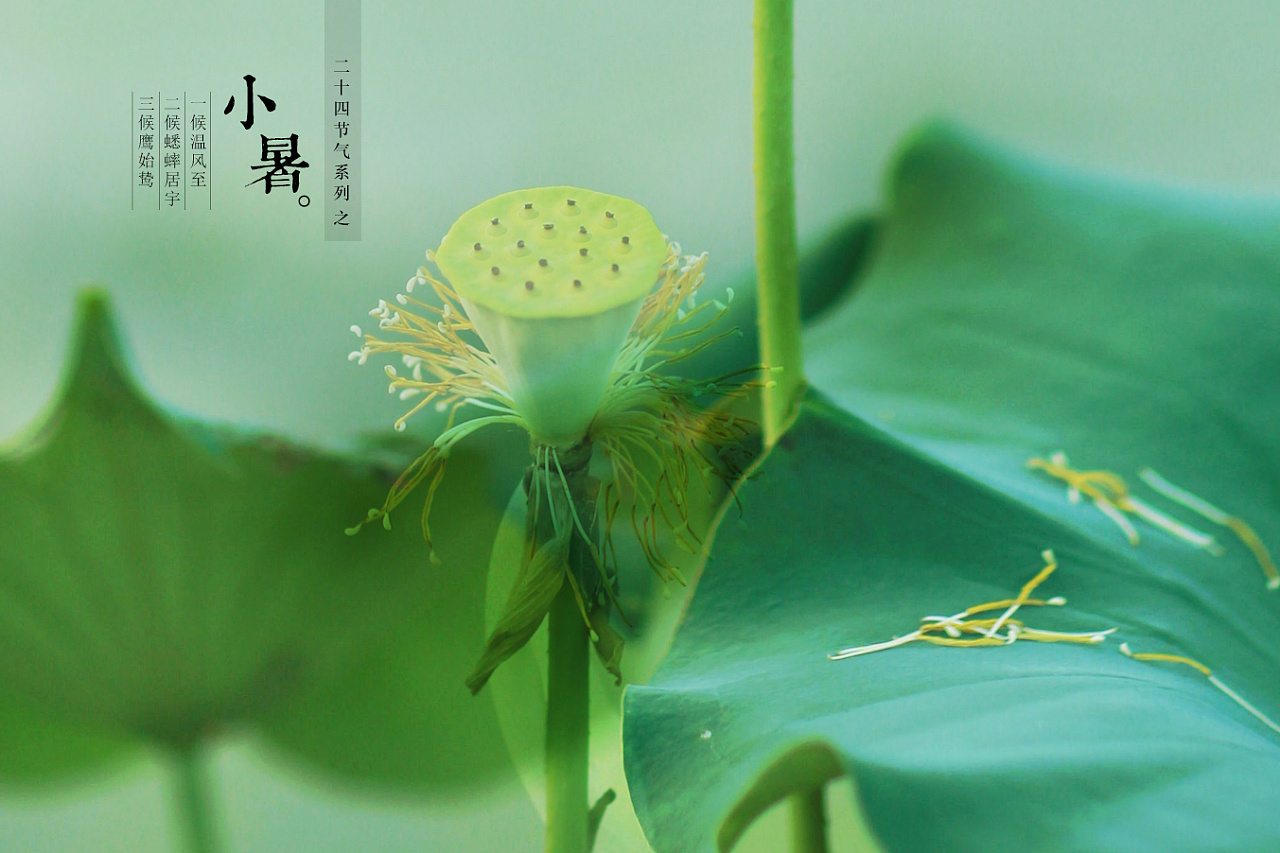Overview
Chinese Name: 小暑
English Name: Xiaoshu; Minor (Lesser) Heat; the 11th of the 24 Solar Terms
Date: July 6 (or 7, or 8)
Sun Position: Celestial Longitude of 105°

Brief Introduction
Xiaoshu 小暑 is the 11th of the 24 Solar Terms二十四节气. It begins when the Sun reaches the celestial longitude of 105° and ends when it reaches the longitude of 120°. It more often refers in particular to the day when the Sun is exactly at the celestial longitude of 105°. Minor Heat signifies the hottest period is coming but the extreme hot point has yet to arrive.
Storms, thunder and hail often happen during Minor Heat, though in some years there might be droughts. One of the prevailing agriculture activities during Minor Heat is staying on top of flood control and drought relief.

In Xiaoshu, high temperatures are good for the growth of the lotus flower. From Minor Heat to the Double Ninth Festival重阳节, the Nelumbo nucifera莲花 is in full bloom, lonely but elegant standing in the middle of lake.
Climatic Change
The Minor Heat begins to enter the Dog days, and the air humidity increases after the dog days of summer. The reason for the high humidity on sultry days of summer is that the southeast wind blows from the Pacific Ocean and the Indian Ocean.
The air is moist, and the humidity of the sea breeze causes the humidity on the dog days. “High temperature and enhancement of humidity” on sultry days are the climatic characteristics of southern China and “high temperature and dryness” in northern regions. The degree of heat in the Xiaoshu is still small, not too hot, and the Dashu大暑 is the hottest time of the year.

The average temperature in the southern region is about 26°C during the summer heat. In mid-July, in the low-altitude valley areas of southeastern China, the daily average temperature and the daily maximum temperature higher than 35°C may begin to appear. In the northern part of the Northwest Plateau, frost and snow can still be seen at this time, which is equivalent to the scene in early spring in South China.
The Lesser summer heat begins, the Meiyu front梅雨 in the Jianghuai江淮 River Basin have ended, and the vast area north of the Huaihe River and Qin Mountains秦岭 in the east begins the southeast monsoon rainy season from the Pacific Ocean. The middle and lower reaches of the Yangtze River are generally high temperature and less rainy weather under the control of subtropical high pressure.
Health tips in Xiaoshu
During the Xiaoshu period, people should pay attention to the combination of work and rest when they are working. Due to excessive sweating, high consumption, and fatigue, it is necessary to pay attention to timely replenishment of water to make full use of the noon rest time. In terms of diet, drinking porridge is a good choice. Adding lotus leaf, tuckahoe, barley and other materials to the porridge is very suitable for this solar term. At the same time, pay attention to the intake of fruit, but do not eat too much, so as not to increase the burden on the stomach, which will cause diarrhea in serious cases.
Folk-Custom Activity
Eating dumplings 吃饺子
Dumplings are the traditional and household food among the Chinese. When the “dog day” comes, people tend to lose their appetites, and dumplings can refresh people’s feelings toward food.

Eating small melons 吃瓜
Minor Heat comes when all kinds of melons are being harvested. One custom in Nanjing, Jiangsu province has to do with enjoying small melons on the day of Minor Heat. Small melons are normally referring to cantaloupes.

Cantaloupe is not only sweet, but also rich in nutritional value. According to analysis, the dry matter of cantaloupe contains vitamins A, B, and C, as well as calcium, phosphorus, iron and other elements. The iron content is two or three times higher than that of chicken and 17 times higher than that of milk. Traditional Chinese medicine believes that melons are cold in nature, and also have the effects of curing hunger, facilitating convenience, replenishing qi, clearing lung heat and relieving cough.
Eating lamb 吃小羊
Eating sheep during Xiaoshu is a traditional custom in southern Shandong and northern Jiangsu. After the beginning of summer, it is the summer leisure time when the three summers have just passed and the autumn harvest has not yet arrived. The farmers who have been busy for half a year will gather in groups of three or five, and seven or eight families to eat sheep.

At this time, the lamb that grew up drinking the mountain spring water and eating the grass for several months is already tender and fragrant. This custom can be traced back to the period of Yao尧 and Shun舜.
Xiaoshu (小暑)
Recommend for you:
Xiaoshu (小暑) reflects the changing of temperature. Shu means heat in Chinese, and Xiaoshu means slight heat. At this time, the weather is getting hotter, but the temperature hasn’t reached the highest degree. The daily average temperature in south China during Xiaoshu is around 26℃ (78.8oF) and in the river valley areas could be as high as 30℃ (86oF). The northern part of the northwest plateau, however, may still be covered with frost and snow. After Xiaoshu, most areas of China enter the rainy season, and crops grow quickly at this time. In some areas, such as the western part of south China, rainstorms, thunderstorms or even hailstones often come, causing floods and landslides. However, the eastern part of south China is often hit by drought, so people have to take measures to fight drought and prevent flood in the same period. An old saying goes, “Southern wind on Xiaoshu leads to no rain on Dashu; thunder on Xiaoshu brings flood on Dashu.”